Introduction
The presumption of innocence law is one of the fundamental principles in the criminal justice system. The principle holds that one the accused should always be considered innocent until such a time that the judicial system proves otherwise through a fair trial. Also known as the principle of fairness, the presumption of innocence law requires the investigative authorities and all other authorities in criminal justice system, to treat suspect with dignity, and without any form of intimidation. The criminal justice system serves the purpose of proving, beyond any reasonable doubt, that the accused indeed committed a given crime as charged.
This means that there is no any other entity that has the power to judge a person other than the criminal justice system. It also means that until this system proves beyond any reasonable doubt that the accused committed the crime, it shall be presumed that the suspect is innocent. The burden of proving otherwise is always put on the prosecution. In the process of conducting the investigation, the prosecutor- and the entire investigative team- must realize that they are yet to prove the crime committed by the suspect. For this reason, they do not have a mandate to subject such a suspect to any form of torture, or frustrations in the name of looking for the evidence.
As Fakhry (1991) says, the prosecution must have had some evidence that led them to arrest the suspect, and they are expected to develop the evidence without subjecting the accused to undue pressure.
It is worrying that this law is largely ignored by the very people who are supposed to uphold it. According to Kant (2008), the judicial system in Palestine is slowly drifting away from this principle of fairness, especially when it comes to interrogating the suspects. The scholar says that courts are accepting confessions made by the suspects when subjected to undue pressure. This is a clear indication that the justice system in the country is ignoring a fundamental principle which defines its very own existence. The current military actions between the Palestinian Hamas and Israel have seen most of the judicial system ignore the presumption of innocence law when dealing with prisoners of war.
As Al-Kisswani (2013) says, being emotive with justice is the basis of making unjust decisions to satisfy the emotions. In this study, the researcher will conduct a review of how the presumption of innocence principle has been applied in Palestine by conducting an interview of Master’s students of law at Alquids University in Palestine. The researcher will also review some literatures in order to determine what other scholars have said in this field.
Literature Review
The presumption of innocence law fundamental defines how a criminal suspect should be treated until such a time that a fair trial will be given by a court of law. In his book ‘The Presumption of Innocence’, Al-Kisswani (2013), outlines the origin of the presumption of innocence law, its application, and its importance in the Islamic legal systems. This scholar also outlines how this principle became universal in the legal systems in the modern world. Al-Kisswani (2013) says, “Presumption does not always contradict the truth, even though – on the other hand –it does not always agree with it” (p. 4).
This principle does not in any way try to defend the accused by holding that he or she is innocent. What it holds is that it is ethical to prove to the court of law that the suspect is guilty as charged. Before then, it is immoral to subject one to any form of pain in relation to the offence. The courts exist to prove the offence that one has committed. There are some actions that can never be reversed or properly compensated. When one is tortured, humiliated or treated in any untoward manner only to be proven innocent in the court of law, it is not possible to reverse the pain that such a person underwent. No amount of money can change the fact that the person was tortured or treated in an inhumane manner.
There are cases where suspects die during the investigation process. In case it is confirmed that the accused is innocent, then it is not possible to bring such a person back to life by simply declaring that he is innocent. It is for this reason that Al-Kisswani (2013) says that it does not cost much to wait for the justice system to make judgment before making rush decision that may later be regrettable. Regrets may not repair some of the damages, but patience does not justice from being administered if indeed the accused is found guilty.
According to Druart (1993), some scholars and practitioners in the legal system have strongly challenged the presumption of innocence principle saying that it offers an unfair immunity to the accused, making it difficult to administer justice. Adamson (2013) says that when a hardcore criminal is arrested, it is sometimes necessary to use a little force in order to get a confession that may lead to the arrest of the accomplices. It is very difficult to make hardcore criminals corporate when they are offered such immunity. They will always wait for their sentence, hoping that the investigative unit will fail to get enough evidence to incriminate them. Many hardcore criminals have evaded justice in this manner and allowed back to the society only to be involved in other criminal offences. The same case applies when handling war prisoners. Palestine has been at war with some of its neighbors, most notable one being Israel. War threatens the very existence of people in the society.
Druart (1993) says that when dealing it is not prudent to use the presumption of innocence law. Such suspects hold vital information that may lead to the rescue of people before the enemy can attack. When such criminals are offered the immunity as required by this principle of fairness, the enemies can strike and wipe out the nation. In fact, the suspects will be hoping to be rescued by their forces, and this will be enough motivation to withhold vital information that may thwart attempts of the enemy forces. In such cases, presumption of innocence law becomes not only irrelevant, but also dangerous for the safety of the nation.
However, Al Kisswani (2013) holds a different view from what the above scholars says when handling hard criminals or criminals of war. Al Kisswani (2013) says, “The state’s power doesn’t entitle it to ignore human rights, even if a crime took place which compromises the rights of the society” (p. 2). This scholar says that it is wrong to disregard the presumption of innocence law simply because a crime is classified a very gross compared to other criminal offences. The presumption of innocence law is not meant for a certain group of criminals. It is not defined on the basis of what crime one has committed.
However, it is a general principle that is meant to protect the rights of the accused till proven guilty in a fair legal process. As Arafat (2001) notes, a suspect- whether accused of ‘gross’ or ‘simple’ criminal act- can be proven guilty or innocent in a court of law based on the proof that shall be presented by the prosecution. The burden of proof lies with the prosecution, and until such a time that they will prove that the accused is guilty, the suspect should not face any form of intimidation simply because the crime is ‘gross’. If the innocence of a person accused of ‘gross’ crime is confirmed through a fair legal process, it may not be possible to reverse the pain suffered.
If the investigative units feel that the accused- either a hardcore criminal or prisoner of war- may help in the process of arresting other suspects or stopping attacks, then the justice system will need to move with speed and try the suspect within the shortest time possible to determine the truth. In case he or she is confirmed to be guilty, then he or she can help with further investigation using means defined by law. The prosecution will need to present all the relevant evidence to the court.
The Definition of the Presumption of Innocence
Al-Kisswani (2013) defines the presumption of innocence as “The treatment of a suspect, in all stages of the proceedings whatever the gravity of the crime attributed to him, that he is innocent until proven guilty by a court ruling” (6).
The burden of the proof lies with the plaintiff and not the suspect. Until such a time that the prosecution will prove beyond any reasonable doubt that the accused is guilty as charged, all the rights of the accused should not be abused, unless it is considered by the courts that it is necessary to deny him the freedom of movement. The freedom of movement may be denied on the basis that the suspect may try to escape from justice. However, this does not guarantee the prosecution any right to use force or abuse any other rights of the accused until the courts rules that he is guilty.
Historical Application of the Presumption of Innocence
The presumption of innocence principle is deeply entrenched in the Islamic teachings, and has been applied by Muslims for a very long period. According to Arafat (2001), Allah says, “We never punish until we have sent a messenger” (p. 12). This is meant to ensure that the punishment can only be given after the sinner has been informed of his sin, and it is confirmed that he was indeed involved in the act considered a sin. The messenger has the responsibility of relaying the information to the sinner of the sin committed and the possible punishment as required by the law. The sinner also has a chance of explaining himself to the messenger why he committed the offence in order to get the truth.
The strong Islamic principle of fairness when dealing with offenders- as defined in the presumption of innocence law- formed the basis of the modern Islamic laws (Al-Kisswani, 2013). The legal system in most of the Islamic countries had this principle deeply entrenched into their system as a way of upholding justice. In his book, Al-Kisswani (2013) gives a historical perspective of the development the modern Islamic laws, and how they upheld the teachings of the Quran when developing these laws. The presumption of innocence was one of the fundamental principles taught in the Quran that define their legal systems. Some of the Islamic nations have entrenched this principle into their constitution. For instance, this law is entrenched into the Palestinian constitution and reads as follows:
“Whatever the crime that took place, and whatever its effects, the search for its perpetrators is subject to the necessity to protect the presumption of innocence as a fundamental constitutional rule which the bulk of procedural rules are subject to its requirements, which requires the suspect to have a humane treatment that prevents torturing him and treating him harshly” (Al-Kisswani, 2013, p.110).
As shown in this except of the Palestinian constitution, this principle is part of the Palestinian law, and has been in use for years. It is, therefore, worrying why some people expected to upholding it are disregarding it when handling criminal suspects.
Palestinian Legislation
The Palestinian legislation has transformed over the years following the challenges of security that the country has been facing in the Middle East. The Palestinian constitution that was drafted by the United Nation and Palestinian Iteration Organization (PLO) under the leadership of Yaser Arafat formed the basis on the modern Palestinian constitution (Arafat, 2001). However, its application has challenges in West Bank which is within its administrative authority but largely influenced by Israeli and Jordanian legislations.
There have also been problems in the Gaza Strip, a Palestinian territory that is governed by Hamas which rules the region using Shariah laws without any regard to the Palestinian constitution. The Code of Penal Procedures that was enacted in 1997 by the Palestinian parliament and later amended in 2002 defines presumption of innocence law and how it should be applied by the judicial system. In Article 337 of the Penal Code, one must be treated well during the trial because he is assumed to be innocent until proven otherwise.
Philosophical View
In this section, the researcher will be interested in analyzing the four main ethical schools relevant to the presumption of innocence law, with focus on the duty ethics as taught by Immanuel Kant.
Being-With Ethics
This is one of the four ethical schools that explain the relevance of application of presumption of innocence law. Adamson (2013) says, “This is the ethics of oneself in relationship to another” (p. 3). This school holds that we are responsible for others, and they are responsible to us. We do not exist as independent entities, but depend on others to make us complete. We, therefore, have the responsibility to be fair to everyone whenever we can because we do expect the same from them. When one is accused of a crime, it is fair to offer him a fair trial- as defined in the presumption of innocence law- without prejudice just as we would desire if we find ourselves in the same position.
Utilitarian Ethics
Utilitarian ethics has been used in various fields, including in law and economics. In law, this school holds that a good act should be able to offer satisfaction to the majority. Adamson (2013) says, “Utilitarianism is generally held to be the view that the morally right action is the action that produces the most good” (p. 2). Irrespective of how the minority may view an action, it will remain justified if it is favored by the majority. This school of thought has faced massive criticism from scholars on various accounts. Adamson (2013) says that the view of the majority is not always right, and making a decision to benefit the majority can sometimes be considered immoral before the law. This principle has been considered to work against the presumption of innocence law, especially in cases where the suspect has earned massive public hatred. The masses may not necessarily mean that the suspect is guilty as charged.
Virtue Ethics
Virtue ethics, also known as value ethics, looks at the morality of actions of an individual. According to Druart (1993), “Virtue ethics looks at the virtuous or moral character of an individual who is carrying out an action as opposed to the ethical duties, rules and laws or the penalties associated with a deed” (p. 5). This means that a person is expected to act morally despite the rules, laws or penalties that may be associated with a moral act.
The desire to act morally should supersede any desire to please the masses or to earn selfish interests. Kant (2008) quotes Aristotle who says, “A person has a function, and the function of a person is to reason, therefore, if a person reason’s well, he is a good person and leads a virtuous life” (p. 21). A person should always strive to ensure that his or her action is clearly guided by the desire to do what is right. As a rational being, everyone is expected to deal with others in the same manner that they would want others to treat them. The presumption of innocence law is meant to protect those who are falsely accused of a given crime. Virtue ethics is strongly against punishing innocent people for a crime committed by others.
Duty Ethics
This school holds that one should always be held accountable to that which was agreed upon either verbally or in writing. In this paper, the focus will be put on Kant’s deontological ethics.
Immanuel Kant’s Deontological ethics
Kant’s deontological ethics is built on the premise that unlike other animals, human being has the capacity to make rational decisions about various issues in the environment.
“Human inclinations, emotions and consequences should play no role in moral action; therefore, the motivation behind an action must be based on obligation and well thought out before the action takes place. Morality should in theory, provide people with a framework of rational rules that guide and prevent certain actions and are independent of personal intentions and desires” (Kant, 2008, p. 84).
Kant holds that the morality of an action directly depends on the will of a human. One can decide to act on a given manner based on what he or she considers good and not what the law says right. Every person has a responsibility to act as per the moral duty defined by what the society considers right. A good action must have a justification of what makes it be considered good in the eyes of people. Kant (2008) says “Morality is not really the doctrine of how to make ourselves happy, but of how we are to be worthy of happiness” (p. 84). Happiness should be earned, and it should not be based on selfish desires of fulfilling one’s needs.
Methodology
Research methodology is a very important part because it clearly directs the researcher on the steps that should be taken in collecting relevant data, their analysis, and presentation. In this section, the researcher will discuss the process of data collection, the survey questions used in the study, and the ethical considerations that defined the process of collecting data.
Data Collection
This study used both primary and secondary sources of data. The primary data was collected from a sampled population of Masters’ of Law students in Alquds University of Palestine through survey. Many participants were willing to take part in this study, but due to the constraints of time, the researcher only sampled 50 students to take part in this study. The focus of the study was to determine the perception of the participants towards application of the Presumption Law in Palestine.
The researcher decided to use Master’s of Law students because they have the knowledge of the Presumption of Innocence Law, and were in a better position to explain how this law has been applied in this country. It was also important to determine how their perception was influenced by the ongoing military conflicts between Hamas of Palestine and the Israeli forces because it would help in making a generalization of how the war in the Middle East affects the application of this law. In order to facilitate mathematical analysis, the researcher used Likert Scale to assign numerical values to the responses given by the participants (Vogt, 2007).
Survey Questions
Research questions play a very important role in any piece of research. They help the researcher to understand the nature of data that is to be collected from the field in order to avoid cases where time is wasted in addressing irrelevant issues (Taylor, 2005).
For this matter, the researcher was keen on formulating research questions that would collect specific information from the students about the presumption of innocence law. In this study, the researcher used of précis questions which allowed the analysis of the students answers to their perception of the application of the presumption of innocence law, and if the participants do believe that the law is applied unconditionally without prejudice. The researcher split the survey questions in two specific sections as shown below. In both sections, the researcher presented the questions in tabular form so that the respondents could just tick as appropriate. This was considered not only appropriate in making it easy for the respondents to answer the questions, but also for the researcher to capture the responses within the shortest time possible.
Knowledge survey questions
The first section was specifically meant to determine the how well these graduate students of law understood the Arabic Islamic justice system, especially the justice system that is used in Palestine. In this section, the researcher was interested in determining the level of knowledge and experience of the selected students in the Arabic Islamic justice system, and whether it is practiced in Palestine. As shown in the table below, the questions were structured, and the participants were expected to tick their responses as appropriate.
- How knowledgeable do you consider yourself to be about the Arabic Islamic justice system?
- What is your personal experience with the Arabic Islamic justice system is?
- Do you understand the Arabic Islamic justice system?
- Do you understand the criminal law in Palestine?
- Do you understand what innocent until proven guilty means?
From these questions, the researcher was able to capture the level of knowledge and experience of the Master’s of Law students who were selected to participant in this study. This was important in determining the relevance of their responses.
Perception survey questions
According to Fakhry (1991), although it is always expected that the justice system should be guided by laws and principles, sometimes perceptions get into the way, and influence the process of administering justice. In this section, the researcher set questions that would determine the students’ perception about the manner in which the Palestinian judicial system is applying the presumption of innocence law without prejudice or favoritism.
- Is it true that the justice system is fair?
- Do you believe that innocent until proven guilty is applied across the Islamic countries?
- Is it true that innocent until proven guilty is applied without prejudice or favoritism?
- Is it true that innocent until proven guilty law has nothing to do with the status of the accused in the community?
- Is it true that most of the cases that you experience treated the person as innocent until he/she proven guilty?
- Is it true that innocent until proven guilty only applies to people who have no connection to the court?
These questions were specifically meant to capture the perception of the participants towards the application of the presumption of innocence law within the Palestinian justice system.
Ethical Issues
It is important to maintain ethics when collecting data from respondents, especially on topics that may raise emotions such as the one for this study. For this reason, it was important to ensure that the identity of the respondents is protected in order to avoid possible cases of intimidation from people with varying opinions. The researcher picked the participants anonymously as a way of protecting their identity. The chosen participants were instructed to pick the questionnaires at assigned locations, fill them without stating their names, and deliver them back to the same location. This way, it was not possible for anyone, including the researcher, to determine their identity. This way, it was not possible to reveal who they actually are to the public. This strategy helped in convincing the students to participate in the study.
Analysis and Findings
In this section, the analyzed primary data that was collected from the participants are presented in order to determine their views about the research questions. As mentioned above, the questions were broadly categorized as knowledge survey questions and perception questions.
Results
Knowledge survey questions
The researcher formulated these questions to capture the knowledge of the participants on the Palestinian justice system, and the application of the presumption of innocence law. The following are the responses that were obtained from each of the questions that were posed to the participants.
How knowledgeable do you consider yourself to be about the Arabic Islamic justice system?
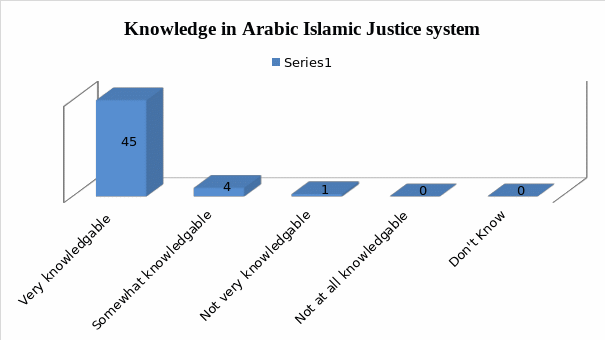
Most of the respondents (90%) stated that they are very knowledgeable on the Arabic Islamic justice system.
What is your personal experience with the Arabic Islamic justice system is?
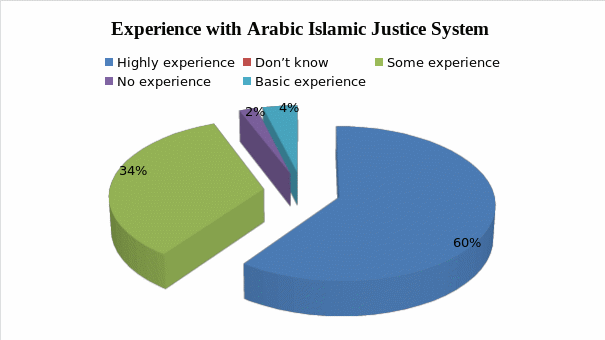
Majority of the respondents (60%) stated that they are highly experienced with the Arabic Islamic justice. Only 2% of the respondents stated that they have no experience because they came for further studies in Palestine from non-Islamic countries.
Do you understand the Arabic Islamic justice system?
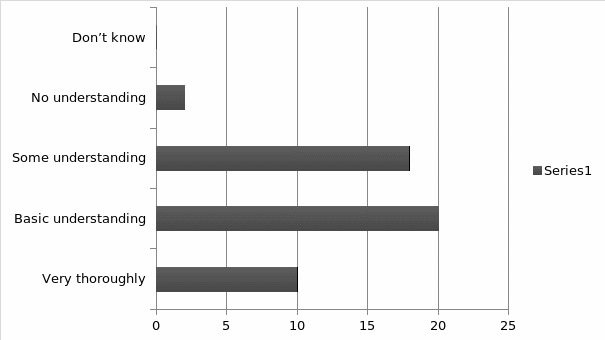
Majority of the respondents stated that they have basic knowledge in Arabic Islamic justice system. A considerable number of the participants also stated that they had some understanding of this law.
Do you understand the criminal law in Palestine?
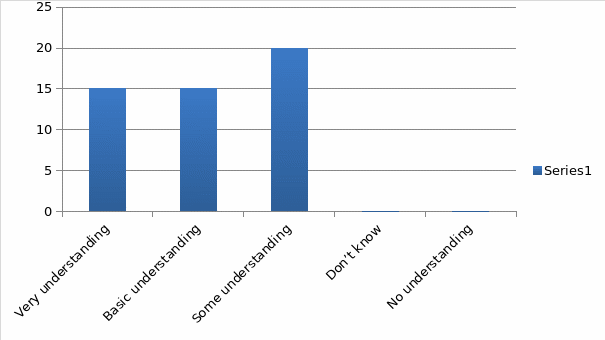
Most of the respondents (40%) stated that they have some understanding of the Palestinian criminal law. 30% of the respondents stated that they have basic understanding of this law, while the other 30% stated that they have high understanding of this law.
Do you understand what innocent until proven guilty means?
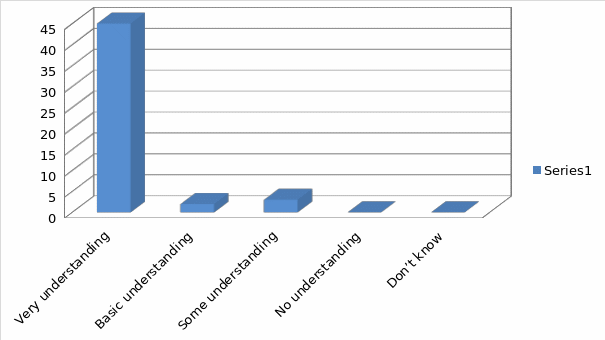
In this question, most of the respondents (90%) stated that they understand what ‘innocent until proven guilty’ means.
Perception survey questions
In this section, the researcher was interested in determining the perception of the participants towards the application of the presumption of innocence law.
Is it true that the justice system is fair?
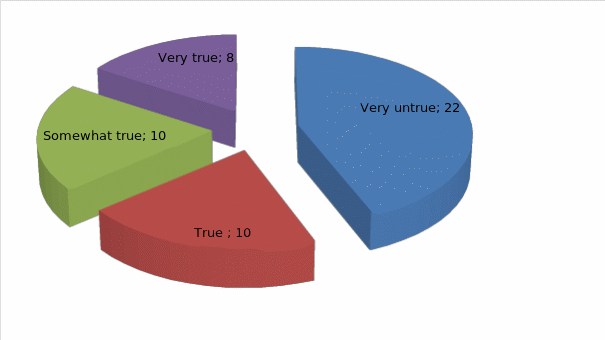
It was noted that most of the participants (44%) felt that the Palestinian justice system is not fair. Only 16% of the participants were strongly convinced that the system is fair.
Do you believe that innocent until proven guilty is applied across the Islamic countries?
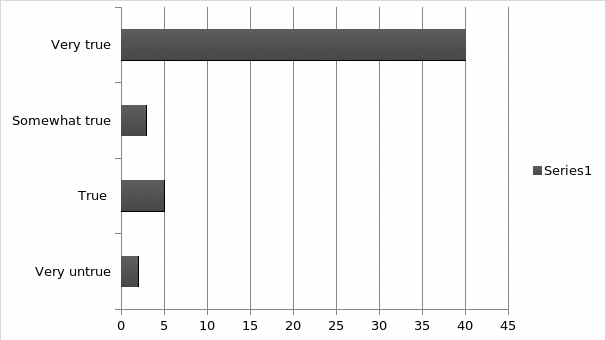
Most of the respondents (80%) had a strong conviction that the presumption of innocence law is applied across the Islamic countries.
Is it true that innocent until proven guilty is applied without prejudice or favoritism?
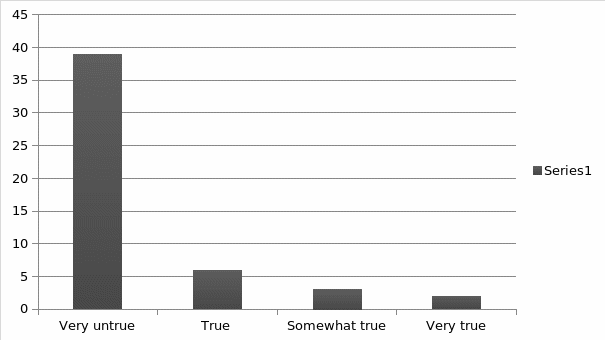
Majority of the respondents (78%) stated that the presumption of innocence law is not applied without prejudice or favoritism in the Palestinian justice system.
Is it true that innocent until proven guilty law has nothing to do with the status of the accused in the community?
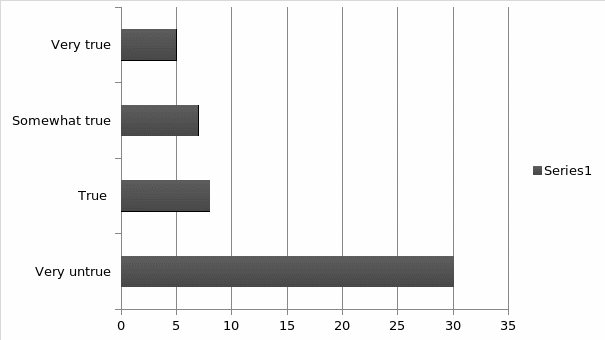
In this question, most of the respondents (60%) felt that the presumption of innocence law has everything to do with the status of a person in the society.
Is it true that innocent until proven guilty only applies to people who have no connection to the court?
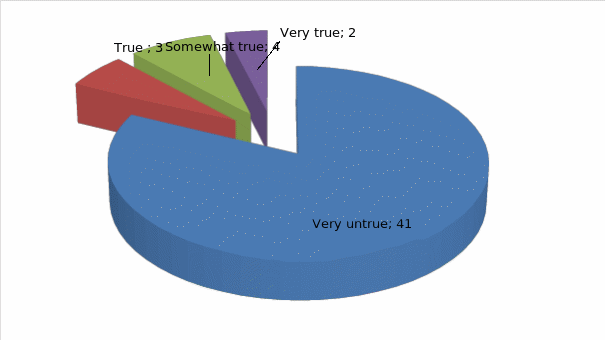
The majority of the respondents (82%) stated that people who have connection to courts may influence the manner in which this law is applied.
Is it true that most of the cases that you experience treated the person as innocent until he/she proven guilty?
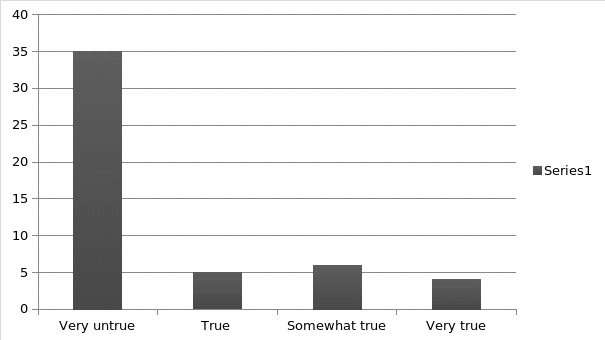
From the response obtained from the customers, it is clear that in most of the cases that they experienced, the accused was not treated as innocent until proved guilty.
Inference
It has been noted that most of the participants have extensive knowledge on criminal law and the Palestinian justice system. Being Master’s of Law students, they know what the presumption of innocence law means, and have experienced how it is applied in the Palestinian justice system. The participants have experienced how the courts in this county apply this law based on a number of issues.
Despite their knowledge of this law, the researcher determined that the opinion of the participants was massively influenced by their political affiliations and the current events in this country, especially the ongoing military conflict with Israel. This is a true reflection of what happens in the justice system in the country. Even though the authorities are aware of the law, they allow emotions and personal interests to control their decisions, and this makes it difficult to achieve justice. The hostility between Palestine and its neighboring countries has also contributed to the poor application of this law in the country.
Conclusion
It is clear from this study that most of the stakeholders in the justice system are aware of the presumption of innocence law, its importance to the accused, and its fundamental role in criminal law. However, it has been ignored by the justice system in various ways. From the literatures reviewed in this study, it was noted that the investigative authorities would use force in order to extract information from the suspects, especially when dealing with ‘hardcore’ criminals. There have been cases where the suspects die in the hands of the investigative authorities. The courts have also played major roles in creating an enabling environment for the prosecution team to disregard this law.
It is unfortunate that most of the Palestinian courts accept evidence extracted from the suspects when subjected to undue pressure. The plea of the accused that the confession was made because of the undue pressure is always ignored by a justice system that serves the interest of those in power. The respondents confirmed this by stating that the presumption of innocence law is largely ignored because of the desire to satisfy the needs of those who are in power.
References
Adamson, P. (2013). Balancing Acts: Arabic Ethical Literature. History of Philosophy Without Any Gaps. Web.
Al-Kisswani, J. (2013). Presumption of Innocence. Jordan: Wael books Publishing. Web.
Arafat, Y. (2001). Penal Procedure Law No. 3. Official Gazette, 442(1), 1-97. Web.
Druart, T. (1993). Al-Kindī’s Ethics, Review of Metaphysics, 47(1), 5. Web.
Fakhry, M. (1991). Ethical theories in Islam. Leiden: E.J. Brill. Web.
Kant, I. (2008). Groundwork of the metaphysics of morals. Lanham, MD: Start Publishers. Web.
Taylor, G. (2005). Integrating qualitative and quantitative methods in research. Lanham: University Press of America. Web.
Vogt, P. (2007). Quantitative Research Methods for Professionals Author. New York: Pearson. Web.